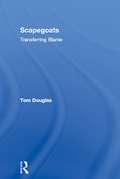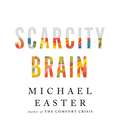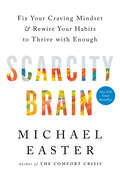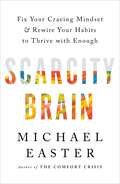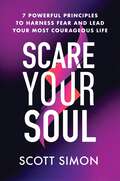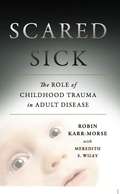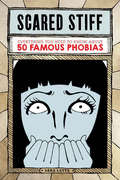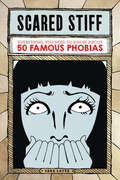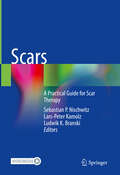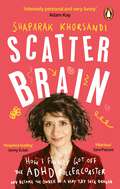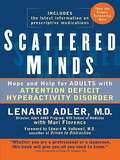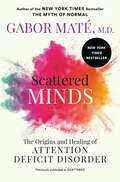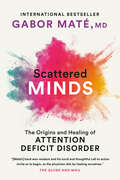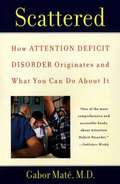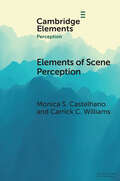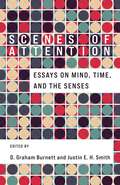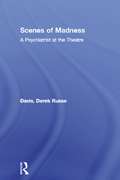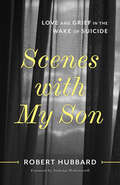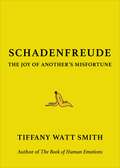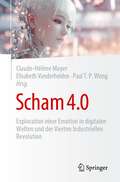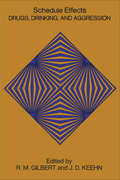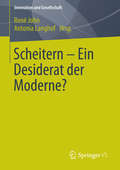- Table View
- List View
Scapegoats: Transferring Blame
by Tom DouglasScapegoats are a universal phenomenon, appearing in all societies at all times in groups large and small, in public and private organizations. Hardly a week passes without some media reference to someone or something being made a scapegoat. Tom Douglas examines the process of scapegoating from the perspectives of victims and perpetrators, tracing its development from earliest times as rite of atonement to the modern forms of the avoidance of blame and the victimisation of innocents. The differences and similarities between the ancient and modern forms are examined to reveal that despite the modern logical explanations of behaviour, the mystical element in the form of superstition is still evident. Directly responding to the Diploma in Social Work's call for texts on anti-discriminatory practice Scapegoats should become essential reading for all social workers in training and practice. Will also be a invaluable resource for all professionals engaging in groupwork and group workers in training.
Scarcity Brain: Fix Your Craving Mindset and Rewire Your Habits to Thrive with Enough
by Michael EasterAn in-depth exploration of why humans are built to crave, from the author of The Comfort CrisisAre we hardwired to crave more? From food and stuff to information and influence, why can't we ever get enough?Michael Easter, author of The Comfort Crisis and one of the world's leading experts on behaviour change, shows that the problem isn't you. The problem is your scarcity mindset, left over from our ancient ancestors. They had to constantly seek and consume to survive because vital survival tools like food, material goods, information, and power were scarce and hard to find. But with our modern ability to easily fulfil our ancient desire for more, our hardwired "scarcity brain" is now backfiring. And new technology and institutions - from dating and entertainment apps to our food and economic systems - are exploiting our scarcity brain. They're bombarding us with subversive "scarcity cues," subtle triggers that lead us into low-reward cravings that hurt us in the long run. Scarcity cues can be direct and all-encompassing, like a sagging economy. Or they can be subtle and slight, like our neighbour buying a shiny new car. Easter traveled the world to consult with remarkable innovators and leading scientists who are finding surprising solutions for our scarcity brain. He discovered simple tactics that can move us towards an abundance mindset, cement healthy habits, and allow us to live our lives to the fullest and appreciate what we have, including how to: - Detect hidden scarcity cues to stop cravings before they start, from a brilliant slot machine designer in a Las Vegas casino laboratory- Turn alone time into the ultimate happiness hack, from artisanal coffee-making Benedictine monks Reignite your exploration gene for a more exciting and fulfilling life, from an astronaut onboard the International Space Station- Reframe how we think about and fix addiction and bad habits, from Iraq's chief psychiatrist- Recognize when you have enough, from a woman who left a million-dollar career path to adventure the worldOur world is overloaded with everything we're built to crave. The fix for scarcity brain isn't to blindly aim for less. It's to understand why we crave more in the first place, shake our worst habits, and use what we already have better. Then we can experience life in a new way - a more satisfying way.(P)2023 Headline Publishing Group Ltd
Scarcity Brain: Fix Your Craving Mindset and Rewire Your Habits to Thrive with Enough
by Michael Easter&“Reveals the biological and evolutionary foundations behind your brain&’s fixations, so you can stop seeking and start living.&”—Melissa Urban, Whole30 CEO and New York Times bestselling author of The Book of Boundaries &“Michael Easter&’s genius is that he puts data around the edges of what we intuitively believe. His work has inspired many to change their lives for the better.&”—Dr. Peter Attia, #1 New York Times bestselling author of OutliveAre we hardwired to crave more? From food and stuff to information and influence, why can&’t we ever get enough?Michael Easter, author of The Comfort Crisis and one of the world&’s leading experts on behavior change, shows that the problem isn&’t you. The problem is your scarcity mindset, left over from our ancient ancestors. They had to constantly seek and consume to survive because vital survival tools like food, material goods, information, and power were scarce and hard to find. But with our modern ability to easily fulfill our ancient desire for more, our hardwired &“scarcity brain&” is now backfiring. And new technology and institutions—from dating and entertainment apps to our food and economic systems—are exploiting our scarcitybrain. They&’re bombarding us with subversive &“scarcitycues,&” subtle triggers that lead us into low-reward cravings that hurt us in the long run. Scarcity cues can be direct and all-encompassing, like a sagging economy. Or they can be subtle and slight, like our neighbor buying a shiny new car.Easter traveled the world to consult with remarkable innovators and leading scientists who are finding surprising solutions for our scarcity brain. He discovered simple tactics that can move us towards an abundance mindset, cement healthy habits, and allow us to live our lives to the fullest and appreciate what we have, including how to:• Detect hidden scarcity cues to stop cravings before they start, from a brilliant slot machine designer in a Las Vegas casino laboratory• Turn alone time into the ultimate happiness hack, from artisanal coffee-making Benedictine monks• Reignite your exploration gene for a more exciting and fulfilling life, from an astronaut onboard the International Space Station• Reframe how we think about and fix addiction and bad habits, from Iraq&’s chief psychiatrist• Recognize when you have enough, from a woman who left a million-dollar career path to adventure the worldOur world is overloaded with everything we&’re built to crave. The fix for scarcity brain isn&’t to blindly aim for less. It&’s to understand why we crave more in the first place, shake our worst habits, and use what we already have better. Then we can experience life in a new way—a more satisfying way.
Scarcity Brain: Fix Your Craving Mindset and Rewire Your Habits to Thrive with Enough
by Michael EasterAre we hardwired to crave more? From food and stuff to information and influence, why can't we ever get enough?Michael Easter, author of The Comfort Crisis and one of the world's leading experts on behavior change, shows that the problem isn't you. The problem is your scarcity mindset, left over from our ancient ancestors. They had to constantly seek and consume to survive because vital survival tools like food, material goods, information, and power were scarce and hard to find. But with our modern ability to easily fulfill our ancient desire for more, our hardwired "scarcity brain" is now backfiring. And new technology and institutions - from dating and entertainment apps to our food and economic systems - are exploiting our scarcity brain. They're bombarding us with subversive "scarcity cues," subtle triggers that lead us into low-reward cravings that hurt us in the long run. Scarcity cues can be direct and all-encompassing, like a sagging economy. Or they can be subtle and slight, like our neighbour buying a shiny new car. Easter traveled the world to consult with remarkable innovators and leading scientists who are finding surprising solutions for our scarcity brain. He discovered simple tactics that can move us towards an abundance mindset, cement healthy habits, and allow us to live our lives to the fullest and appreciate what we have, including how to: - Detect hidden scarcity cues to stop cravings before they start, from a brilliant slot machine designer in a Las Vegas casino laboratory- Turn alone time into the ultimate happiness hack, from artisanal coffee-making Benedictine monks Reignite your exploration gene for a more exciting and fulfilling life, from an astronaut onboard the International Space Station- Reframe how we think about and fix addiction and bad habits, from Iraq's chief psychiatrist- Recognize when you have enough, from a woman who left a million-dollar career path to adventure the worldOur world is overloaded with everything we're built to crave. The fix for scarcity brain isn't to blindly aim for less. It's to understand why we crave more in the first place, shake our worst habits, and use what we already have better. Then we can experience life in a new way - a more satisfying way.
Scare Your Soul: 7 Powerful Principles to Harness Fear and Lead Your Most Courageous Life
by Scott Simon"A sharply packaged self-help book with an emphasis on facing your fears." (Kirkus) Find the courage to run toward your fears, embrace uncertainty, and get the most out of life by practicing courageous habits every day with the helpful guidance of this powerful book. It&’s not easy to be courageous. Feelings of fear and uncertainty often stop us dead in our tracks. But what if you had the courage to take action anyway? What changes would you make to transform your current reality into the life of your dreams? Here&’s the good news — like a muscle, courage grows stronger the more you exercise it. And Scare Your Soul will not only teach you how to exercise courage but will guide you in taking small, boundary-pushing actions to expand your comfort zone (so that you feel less fear and more confidence with each action). By combining research on positive psychology with real-life stories of Scare Your Soul participants, international thought leader and happiness entrepreneur Scott Simon challenges you to confront your limiting beliefs. With writing prompts, activities, and real-world challenges, Scare Your Soul is an interactive roadmap to building bravery.Scare Your Soul teaches you that the greatest antidote to much of what ails you in your life isn&’t achievement, it&’s action. So if you crave an extraordinary life but feel like you don&’t know how to take &“extra&” ordinary action, this book is for you. It&’s time to Scare Your Soul.
Scared Sick: The Role of Childhood Trauma in Adult Disease
by Robin Karr-Morse Meredith S. WileyThe first years of human life are more important than we ever realized. InScared Sick, Robin Karr-Morse connects psychology, neurobiology, endocrinology, immunology, and genetics to demonstrate how chronic fear in infancy and early childhood- when we are most helpless-lies at the root of common diseases in adulthood. Compassionate and based on the latest research,Scared Sickwill unveil a major public health crisis. Highlighting case studies and cutting-edge scientific findings, Karr- Morse shows how our innate fight-or-flight system can injure us if overworked in the early stages of life. Persistent stress can trigger diabetes, heart disease, obesity, depression, and addiction later on.
Scared Stiff
by Sara Latta G. E. GallasFear is a primal human emotion, and it often does play an important role in keeping us safe from threats. It's part of our evolutionary makeup, after all. But fears can also spiral out of control, and if your perfectly reasonable fear of snakes has metastasized to the point that you run screaming from every uncoiled hose, then (news flash!) you've got yourself a phobia. Human phobias are strange, diverse, and actually have the power to teach us a lot about who we are and where we came from. And in this book, author Sarah Latta blends biology, psychology, history, and pop culture to provide a comprehensive account of 50 essential fears, from arachnophobia to zoophobia. Additionally, the book includes:- An explanation of the history behind each phobia, and a discussion of notable people who have suffered from the fear- Sidebars that highlight famous phobic moments from history and pop culture- Updates on how successful various phobia treatments have beenPhobias are no laughing matter if you've got one, but sometimes the first step to overcoming your fear is understanding that sometimes we're afraid of a lot of really weird things. So whether you're looking for perspective, information, or just want to know what Madonna and David Beckham are afraid of, this is the book for you. (Bibliophobes, however, should probably keep their distance.)
Scared Stiff: Everything You Need to Know About 50 Famous Phobias
by Sara LattaEveryone knows what it is to be afraid. But phobias take the normal (and even helpful!) human emotion of fear to a much more visceral, even primal, place. For some people, it’s a spider that does it. For others it’s a clown, or a trans-Atlantic flight, or even just a puddle of water. It’s the thing that stops us in our tracks, sets our hearts racing, and stands our hairs on end. Scared Stiff takes readers on a journey through these experiences—using biology, psychology, and history (not to mention pop culture) to explain where our phobias came from, how they affect us, and how we might eventually overcome them.
Scars: A Practical Guide for Scar Therapy
by Lars-Peter Kamolz Sebastian P. Nischwitz Ludwik K. BranskiThis unique medical guide focuses on scars. The impact of scars is often underestimated and rarely discussed, and they are considered an inevitable side effect of surgery or trauma. Although therapies for distressing scars do exist, many are based on myths rather than evidence. This strongly practice-oriented book provides step-by-step instructions with scales and measuring instruments for assessing scars. Featuring brief abstracts and summaries, this valuable reference resource benefits clinical professionals such as doctors and nurses alike. It will appeal to practitioners who want to understand the nature and background of planned treatments, and to non-experts who simply want to broaden their medical horizons.
Scatter Brain: How I finally got off the ADHD rollercoaster and became the owner of a very tidy sock drawer
by Shaparak KhorsandiSome brains, through no fault of their own, pack a bag, turn the lights off and run away to the seaside the moment they are meant to be doing homework, paying bills or not putting the cat in the fridge. These are ADHD brains. I have one and believe they are as common as being left-handed, flat footed or genuinely enjoying anchovies on a pizza. Undiagnosed Attention Deficit Hyperactivity Disorder made my life a frustrating, maddening rollercoaster. I had very little focus except when I was hyper-focusing (and then it would always be on the wrong things), I made the same mistakes over and over again, regularly burning myself out until I was sobbing. When I finally was diagnosed in my 40s it felt like the lights had been turned on after a lifetime in the dark. Join much-loved comedian Shappi Khorsandi as she looks back on her life through the lens of ADHD and finally makes sense of the chaos. From discovering the joys of shoplifting through to finally understanding her attraction to toxic men, Scatter Brain will have you laughing (and crying) as you find out what it's really like to live a life out of control. Whether you suspect you might have ADHD or you're here to enjoy the ride, let Shappi take you on her hilarious journey of self-discovery where you just might learn something useful about yourself too!
Scattered Minds
by Adler LenardAn important new book on an increasingly talked-about condition that affects more than 8 million American adults. Contrary to popular belief, Attention Deficit Hyperactivity Disorder (ADHD) isn't just a kids' disorder. In fact, after depression, it is the most common psychiatric disorder, affecting more than 8 million American adults. With symptoms that include difficulty staying focused, paying attention, and getting things done, this chronic condition takes a toll on career achievement and personal relationships-but is treatable and manageable. Dr. Lenard Adler, director of the Adult ADHD Program at New York University Medical Center, presents the latest proven information on this widely misunderstood condition, revealing hidden warning signs, debunking common misconceptions, and offering information on getting an accurate diagnosis, along with treatment options that include cutting-edge medications and proven coping strategies. Clear, concise, and filled with instructive stories of adults from various walks of life who have learned to manage their ADHD, Scattered Mindsprovides much-needed practical information for a growing number of adults who suspect or know they have problems staying focused and performing to their full potentia
Scattered Minds: The Origins and Healing of Attention Deficit Disorder
by Gabor MatéFrom renowned mental health expert and speaker Dr. Gabor Maté, Scattered Minds explodes the myth of attention deficit disorder (ADD/ADHD) as genetically based—and offers real hope and advice for children and adults who live with the condition. <p><p>In this breakthrough guide to understanding, treating, and healing Attention Deficit Disorder, Dr. Gabor Maté, bestselling author of The Myth of Normal, and himself diagnosed with ADD: demonstrates that the condition is not a genetic “illness” but a response to environmental stress, explains that in ADD, circuits in the brain whose job is emotional self-regulation and attention control fail to develop in infancy – and why, shows how "distractibility" is the psychological product of life experience, allows parents to understand what makes their ADD children tick, and adults with ADD to gain insights into their emotions and behaviors, expresses optimism about neurological development even in adulthood, presents a program of how to promote this development in both children and adults. <p><p>Whereas other books on the subject describe the condition as inherited, Dr. Maté believes that our social and emotional environments play a key role in both the cause of and cure for this condition. In Scattered Minds, he describes the painful realities of ADD and its effect on children as well as on career and social paths in adults.While acknowledging that genetics may indeed play a part in predisposing a person toward ADD, Dr. Maté moves beyond that to focus on the things we can control: changes in environment, family dynamics, and parenting choices. He draws heavily on his own experience with the disorder, as both an ADD sufferer and the parent of diagnosed children. Providing a thorough overview of ADD and its treatments, without blaming anyone, Scattered Minds is essential and life-changing reading for the millions of ADD sufferers in North America today. <p> <b>New York Times Bestseller</b>
Scattered Minds: The Origins and Healing of Attention Deficit Disorder
by Gabor MatéINTERNATIONAL BESTSELLER From renowned mental health expert and speaker Gabor Maté, MD, Scattered Minds explodes the myth of attention deficit disorder (ADD/ADHD) as genetically based—and offers real hope and advice for children and adults who live with the condition. In this breakthrough guide to understanding, treating, and healing attention deficit disorder, Dr. Gabor Maté, an adult with ADD and the father of three ADD children, shares information on: · The external factors that trigger ADD/ADHD · How to create an environment that promotes health and healing · Ritalin and other drugs · ADD in adults …and much more Attention Deficit Disorder (ADD/ADHD) has remained a controversial topic in recent years. Whereas other books on the subject describe the condition as inherited, Dr. Maté shows how our social and emotional environments play a key role in both the cause of and cure for the condition. In Scattered Minds, he describes the painful realities of ADD/ADHD and its effect on children as well as on careers and social paths in adults. While acknowledging that genetics may indeed play a part in predisposing a person toward ADD/ADHD, Maté moves beyond that to focus on the things we can control: changes in environment, family dynamics, and parenting choices. He draws heavily on his own experience with the disorder, as both an ADD sufferer and the parent of three diagnosed children. Providing a thorough overview of ADD/ADHD and its treatments, Scattered Minds is essential and life-changing reading for the millions of ADD/ADHD sufferers in North America today.
Scattered: How Attention Deficit Disorder Originates and What You Can Do About It
by Gabor MateAttention Deficit Disorder (ADD) has quickly become a controversial topic in recent years. Whereas other books on the subject describe the condition as inherited, Dr. Gabor Maté believes that our social and emotional environments play a key role in both the cause of and cure for this condition. In Scattered, he describes the painful realities of ADD and its effect on children as well as on career and social paths in adults. While acknowledging that genetics may indeed play a part in predisposing a person toward ADD, Dr. Maté moves beyond that to focus on the things we can control: changes in environment, family dynamics, and parenting choices. He draws heavily on his own experience with the disorder, as both an ADD sufferer and the parent of three diagnosed children. Providing a thorough overview of ADD and its treatments, Scattered is essential and life-changing reading for the millions of ADD sufferers in North America today.
Scene Perception (Elements in Perception)
by Monica S. Castelhano Carrick C. WilliamsVisual cognitive processes have traditionally been examined with simplified stimuli, but generalization of these processes to the real-world is not always straightforward. Using images, computer-generated images, and virtual environments, researchers have examined processing of visual information in the real-world. Although referred to as scene perception, this research field encompasses many aspects of scene processing. Beyond the perception of visual features, scene processing is fundamentally influenced and constrained by semantic information as well as spatial layout and spatial associations with objects. In this review, we will present recent advances in how scene processing occurs within a few seconds of exposure, how scene information is retained in the long-term, and how different tasks affect attention in scene processing. By considering the characteristics of real-world scenes, as well as different time windows of processing, we can develop a fuller appreciation for the research that falls under the wider umbrella of scene processing.
Scenes from the High Desert: Julian Steward's Life and Theory
by Virginia KernsJulian Steward (1902-72) is best remembered in American anthropology as the creator of cultural ecology, a theoretical approach that has influenced generations of archaeologists and cultural anthropologists. Virginia Kerns considers the intellectual and emotional influences of Steward's remarkable career, exploring his early life in the American West, his continued attachments to western landscapes and inhabitants, his research with Native Americans, and the writing of his classic work, Theory of Culture Change. With fluid prose and rich detail, the book captures the essence and breadth of Steward's career while carefully measuring the ways he reinforced the male-centered structure of mid-twentieth-century American anthropology.
Scenes of Attention: Essays on Mind, Time, and the Senses
by Burnett, D. Graham; Smith, Justin E. H.Are we paying enough attention? At least since the nineteenth century, critics have alleged a widespread and profound failure of attentiveness—to others, to ourselves, to the world around us, to what is truly worthy of focus. Why is there such great anxiety over attention? What is at stake in understanding attention and the challenges it faces?This book investigates attention from a range of disciplinary perspectives, including philosophy, history, anthropology, art history, and comparative literature. Each chapter begins with a concrete scene whose protagonists are trying—and often failing—to attend. Authors examine key moments in the history of the study of attention; pose attention as a philosophical problem; explore the links between attention, culture, and technology; and consider the significance of attention for conceptualizations of human subjectivity. Readers encounter nineteenth-century experiments in boredom, ornithologists conveying sound through field notations, wearable attention-enhancing prosthetics, students using online learning platforms, and inquiries into attention as a cognitive state and moral virtue.Amid mounting concern about digital mediation of experience, the rise of “surveillance capitalism,” and the commodification of attention, Scenes of Attention deepens the thinking that is needed to protect the freedom of attention and the forms of life that make it possible.
Scenes of Madness: A Psychiatrist at the Theatre
by Derek Russell DavisDerek Russell Davis argues that mental health professionals working in a hospital or clinic setting can learn much from playwrights about the psychological processes in mental illness. Looking at such diverse characters as Orestes, Hamlet, Lear, Ophelia, Peer Gynt, Oswald Alving and Blanche Dubois, Dr Davis shows how madness in plays is put into the context of the crucial experiences in an individual's history and current relationships, and demonstrates that these stories can be a new and exciting source of insight into mental illness.
Scenes with My Son: Love and Grief in the Wake of Suicide
by Robert HubbardA celebration and an elegy, Scenes with My Son sensitively renders the terrible privilege of grief in the wake of suicide.After years of battling clinical depression exacerbated by autism, Auggie Hubbard died by suicide at the age of 19. In this poignant tribute to his son, Robert Hubbard—a theatre scholar and actor—stages Auggie&’s life in a series of vivid and tender scenes: Auggie&’s insatiable hunger for Accelerated Reader points. His tireless lightsaber practice in the local park. His sonorous tuba practice in the ward of his inpatient program. Through these anecdotes of Auggie&’s life and the days following his death, readers journey with a family shaken by mental illness and share in their hard-won joys in defiance of depression.Refusing easy answers and clichés about &“God&’s plan,&” Hubbard unflinchingly asks: Does faith matter amid such tragedy? What do you do when awareness isn&’t enough? When you&’ve tried so hard to keep your child safe, but your efforts fail? His honesty and vulnerability—and his tender portrait of Auggie—are gifts to all who live with their own questions in the wake of a loved one&’s death.
Schadenfreude
by Wilco W. van Dijk Jaap W. OuwerkerkWhen someone suffers a mishap, a setback or a downfall, we sometimes find ourselves experiencing schadenfreude - an emotion defined as deriving pleasure from another's misfortune. Schadenfreude is a common experience and an emotion which is seemingly inherent to social being. This book offers a comprehensive summary of current theoretical and empirical work on schadenfreude from psychological, philosophical and other scientific perspectives. The chapters explore justice as an underlying motive for schadenfreude, and the role played by social comparison processes and envy in evoking pleasure at the misfortunes of others in interpersonal relations. Schadenfreude is also described as a common phenomenon in intergroup relations. This is a compelling volume on a fascinating subject matter that aims to increase our understanding of the nature of this emotion and the role it plays in social relations.
Schadenfreude: The Joy of Another's Misfortune (Wellcome Ser.)
by Tiffany Watt SmithAn entertaining and insightful exploration of schadenfreude: the deliciously dark and complex joy we've all felt, from time to time, at news of others' misfortunes. You might feel schadenfreude when...the boss calls himself "Head of Pubic Services" on an important letter.a cool guy swings back on his chair, and it tips over.a Celebrity Vegan is caught in the cheese aisle. an aggressive driver cuts you off - and then gets pulled over.your co-worker heats up fish in the microwave, then gets food poisoning.an urban unicyclist almost collides with a parked car.someone cuts the line for the ATM - and then it swallows their card.your effortlessly attractive friend gets dumped.We all know the pleasure felt at someone else's misfortune. The Germans named this furtive delight in another's failure schadenfreude (from schaden damage, and freude, joy), and it has perplexed philosophers and psychologists for centuries. Why can it be so satisfying to witness another's distress? And what, if anything, should we do about it?Schadenfreude illuminates this hidden emotion, inviting readers to reflect on its pleasures, and how we use other people's miseries to feel better about ourselves. Written in an exploratory, evocative form, it weaves examples from literature, philosophy, film, and music together with personal observation and historical and cultural analysis. And in today's world of polarized politics, twitter trolls and "sidebars of shame," it couldn't be timelier. Engaging, insightful, and entertaining, Schadenfreude makes the case for thinking afresh about the role this much-maligned emotion plays in our lives -- perhaps even embracing it.
Scham 4.0: Exploration einer Emotion in digitalen Welten und der Vierten Industriellen Revolution
by Elisabeth Vanderheiden Claude-Hélène Mayer Paul T. P. WongDieser Sammelband bietet neue Perspektiven darauf, wie das Gefühl Scham in digitalen Welten und in der Industrie 4.0 erlebt und verändert wird. Die Herausgeber*innen und Autor*innen diskutieren, wie Individuen und Organisationen Scham am Arbeitsplatz, in beruflichen und privaten Kontexten und im Hinblick auf soziokulturelle Lebensstilveränderungen konstruktiv transformieren können. Die Beiträge in diesem Band ermöglichen es Forscher*innen und Praktiker*innen gleichermaßen, das Thema Scham und seine Spezifika in einer hochdynamischen und sich schnell verändernden Zeit zu erschließen. Das Verständnis für diese Emotion im Zusammenhang mit Home Office, automatisierten Realitäten und smarten Systemen oder digitalisierten Lebens- und Arbeitsstilen wird vertieft. Durch den Einsatz transdisziplinärer und transkultureller Perspektiven erörtert der Band darüber hinaus Scham im Kontext neuer Lebensstile, Religion, Geschlecht, sexueller Unterdrückung und psychischer Erkrankungen. Forscher*innen, Praktiker*innen und Studierende aus den Bereichen Arbeits- und Organisationspsychologie, Positive Psychologie, Organisationsforschung, Zukunftsforschung, Gesundheits- und Arbeitswissenschaft, Therapie und Beratung, Emotionswissenschaften, Management, Führung und Personalwesen werden die Beiträge als hochaktuell, aufschlussreich und praxisrelevant empfinden.
Schedule Effects: Drugs, Drinking, and Aggression
by R. M. Gilbert J. D. KeehnIn Toronto in 1970 the Addiction Research Foundation held a symposium on schedule-induced and schedule-dependent phenomena. The Foundation's main concerns with drug-behaviour-environment interactions, but because it is difficult to consider these interactions in isolation from general behavioural phenomena, the symposium was arranged around topics that are not specific to drug effects. This book contains those contributions to the symposium that focused on phenomena associated with schedules of reinforcement. Most of the papers have been extensively revised for the purpose of this publication. Three kinds of schedule effect are examined in the book. Schedule dependent phenomena arise when the effect on behaviour of an operation, such as the administration of a drug, depends on the schedule of reinforcement maintaining the behaviour. Two aspects of these phenomena are treated in detail by J.W. McKearney, who emphasizes drug effects, and by D.E. Blackman, who concentrates on the intrusion of stimuli that signal electric shock. A second kind of schedule effect is discussed by T. Thompson and R. Pickens, who show that reinforcing drugs are subject to scheduling variables, in common with other reinforcements. The remaining chapters focus on schedule-induced phenomena, although other schedule effects are also considered. Behaviour is schedule-induced when it occurs as the result of the application of a reinforcement schedule to other behaviour without being specified in that schedule. J.D. Keehn discusses these phenomena in the context of behaviour that cannot be accounted for in terms of the simple reinforcement model. T.D. Hawkins and his collaborators report a series of hitherto unpublished experiments, including work on alcohol intoxication as a schedule-induced phenomenon. J.L. Falk reviews the studies of schedule induced behaviour, which he labels adjunctive, and provides an account that recognizes ethological analyses of related phenomena, a feature too of the chapter by W. Wuttke and N.K. Innis. The two final chapters are concerned with aggression induced by scheduling and other factors. R.R. Hutchinson and G. Emley examine the temporal relationships of the different kinds of behaviour that can occur when electric shock is delivered at frequent intervals, and describes the effects of various drugs on these relationships. R. Ulrich and his colleagues provide a comprehensive review of shock-induced aggression and its controlling variables. The book will be of interest to advanced students and professionals in psychology, pharmacology, and related disciplines.
Scheitern - Ein Desiderat der Moderne?
by Antonia Langhof René JohnDas Phänomen ,,Scheiterns" findet man auf der Schattenseite der Gesellschaft. Ist es dann schon verständlich, dass dessen begriffliche Bestimmung und empirische Beschreibung durch die Sozialwissenschaften nur unzureichend ausfällt? Bis auf die organisationstheoretischen Bemühungen macht die Diskussion einen eher ungenügenden Eindruck. Dabei bildet Scheitern unvermeidlich die negative Folie für den Nachweis erfolgreicher Lösungen. Von daher weist Scheitern eine heimliche Prominenz auf, der sich die Sozialwissenschaften stellen müssen. Mit dem Buch wird die bisherige Diskussion dazu aufgenommen, fortgeführt und angereichert. Auf diese Weise wird ein weiterer Grundstein für die Etablierung der Perspektive des Scheiterns in den Sozialwissenschaften gelegt, mit dem nicht nur dieses höchst relevante Problem in den wissenschaftlichen Fokus gerückt wird, sondern überhaupt erst brauchbare Erkenntnisse über die Bedingungen der Möglichkeit des Erfolges zu gewinnen sind.
Scheitern - Organisations- und wirtschaftssoziologische Analysen
by Jens Bergmann Matthias Hahn Antonia Langhof Gabriele WagnerReserviert man den Begriff des Scheiterns lediglich für die nicht gelingende Herstellung oder Aufrechterhaltung sozialer Ordnung, dann vergibt die Soziologie ihr Potenzial an differenzierter Analysefähigkeit. An diesem Schwachpunkt der soziologischen Analyse möchte der vorliegende Sammelband ansetzen und konzentriert sich daher auf Formen, Funktionen und Folgen des Scheiterns sowie auf ihre Bearbeitung. In den Beiträgen werden dabei ganz unterschiedliche Phänomene des Scheiterns in den Blick genommen und analysiert. Dabei fällt in der Zusammenschau vor allem eines auf: ,Das Soziale' scheint extrem flexibel und widerstandsfähig. Bemerkenswerterweise - und das ist die Quintessenz der Beiträge - scheitert das Scheitern offensichtlich immer wieder an der Widerständigkeit des Sozialen. Die differenzierte Auseinandersetzung mit Phänomenen und Facetten des Scheiterns ermöglicht es, die Widerständigkeit des Sozialen in ihrer Doppelgestalt ernst zu nehmen: sie verwandelt Erfolgsprojekte en masse in scheiternde Konstellationen und gleichzeitig bringt sie das Scheitern zum Scheitern.
